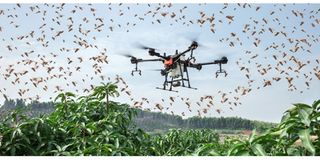Prime
Why EA desert locust control body restructuring is crucial

Dar es Salaam. Desert Locust Control Organisation-East Africa (DLCO-EA) is grappling with different challenges including inadequate funds.
The challenges have adversely affected its operations to control and manage migratory pests in the region.
The organisation’s air unit has insufficient and elderly aircraft, a situation that has hindered execution of the core responsibilities.
It says if the challenges are addressed, will help improve food security in the region and making East Africa the world’s food basket.
Therefore, members have emphasised the need for restructuring DLCO-EA in order to attract more funding instead of relying on members' contributions.
Restructuring will enable the organisation to embrace technology transformation through acquisition of modern aircraft and introduction of Unmanned Aerial Vehicle (UAV), commonly known as drones.
Reorganisation also aims at increasing inclusiveness in strengthening the fight against migratory pests whereby local resources and facilities mobilised by DLCO-EA members could be used for the benefit of other members.
Demand for DLCO-EA reformation gained impetus during the organisation’s 68th Regular Session held in Dar es Salaam. The gathering was attended by Agriculture ministers from member countries.
DLCO-EA is a nine member organisation formed by Uganda, Kenya, Tanzania, Ethiopia, Sudan, South Sudan, Eritrea, Somalia, and Djibouti.
The organisation was introduced to enhance control operations and forecast techniques against upsurge and plague of the Desert Locust and other migratory pests such as the larvae of the African Armyworm, the Quelea Bird and the Tsetse fly.
Speaking during the 68th session, DLCO-EA director Mwesigwa Rwaheru said financial challenges have led to delayed payment of staff salaries and accumulation of debts to suppliers and service providers.
He said the organisation received $2.265 million during the 2022/23 Fiscal Year, constituting $1.799 million on current year contributions and $466,171 on arrears.
The director said the organisation had $12.4 million of unpaid arrears as of June 30, 2023, noting that the 2022/23 contribution made by member countries was equivalent to 83 percent of approved budget.
The amount has, however, improved significantly from 38 percent that was contributed in the 2021/22 Fiscal Year.
“We thank member countries that have maintained their support to the organisation by paying annual obligations. Noteworthy, Djibouti, South Sudan and Somalia didn’t make any contribution in the current fiscal fear,” he said.
He urged member countries to continue offering their support to enhance the organisation’s capacity and preparedness to combat migratory pests and promote food security in the region.
Mr Rwaheru said the strategic plan that was approved during the 67th Regular Session was anchored on the modernisation of the organisation for effective response to the needs of member countries.
“We therefore need to embrace technological advancements by acquiring modern aircraft that are fuel efficient and adapt use of UAV for surveillance and control operations where appropriate,” he said.
He said the organisation’s air unit has eight aircraft, five of them were designed for aerial control operations (four serviceable).
He said the remaining Cessna Caravan is used for revenue generation.
He said one Beechcraft Baron is used for training DLCO-EA pilots and license renewals, adding that one Beaver was not operational awaiting repairs, while one Islander has been on international market for sale.
“Note that most of these aircraft are rather old (1970’s) and most of the time affect the organisation’s operation efficiency. At the moment, only four aircraft can be deployed for aerial survey and control operations,” he said.
He told DLCO-EA members that the Food and Agriculture Organization (FAO) and partners handed over a modern spray aircraft (Air Tractor 504) to DLCO-EA in March this year, at a ceremony held in Nairobi, Kenya.
Tanzania Minister for Agriculture Hussein Bashe said the need for DLCO-EA reforms comes at a time the FAO report shows that over $220 million of the global economy is used for fighting against locusts and migratory pests annually.
He said the amount is used as 40 percent of produced food is lost in pests' outbreak.
Mr Bashe hinted that world population is expected to hit 9.7 billion in 2050; that of Africa is forecast at 2.4 billion and Tanzania will record 130 million.
“Population growth challenges DLCO-EA members to empower the organisation in order to efficiently carry its responsibilities and contribute to food security despite growing impacts of climate change,” he said.
He said DLCO-EA restructuring as endorsed by members would increase partnership with development partners in realising the Africa agricultural transformation agenda.
Outlining priority areas during restructuring, he said improvement should be done in the areas of research and development and the use of Information Communication Technology (ICT) for early warning and forecasts.
He said adaptation to precision agriculture should promote use of drones for survey and control of locusts and other migratory pests.
“My humble plea to member countries is that let’s fulfil our obligations by paying annual fees and arrears in order to enable DLCO-EA to perform its duties as provided in the convention of its establishment,” he said.
Mr Bashe emphasised that there was a need to complete the restructuring process and create strong partnership with other players and partners.
He suggested the DLCO-EA to closely work with Tanzania technical staff as the country revamps its Air Unit (Kilimo Anga) under the Tanzania Plant Health and Pesticides Authority (TPHPA).
He said the move aims at providing the country with modern agricultural aviation services and innovation hubs for precision agriculture.
According to him, Tanzania was in the process of procuring a spraying aircraft, noting that the country has managed to secure 45 drones for pesticide spraying and surveillance.
“Restructuring should ensure that local facilities and technical knowhow mobilised by member countries can be used to support other member states,” he said, insisting that the ongoing trend forces member countries to complement each other.
He said member states with financial muscles should support others through established facilities in their respective countries for the benefit of other members.
He said if the problem occurs in Uganda, Tanzania, Kenya or other countries, it will spread to other countries in the region.




